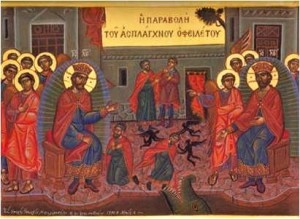What is not clear? – Metropolitan of Strumica Naum
We all know the commandment of God: “Therefore, whatever you want men to do to you, do also to them, for this is the Law and the Prophets.” (Matthew 7:12).
And there is nothing vague here. Unless someone is ungodly. In today’s Gospel reading we can see a typical example of how we should not as well as how we should behave towards our neighbours.
“Therefore the kingdom of heaven is like a certain king who wanted to settle accounts with his servants. And when he had begun to settle accounts, one was brought to him who owed him ten thousand talents. But as he was not able to pay, his master commanded that he be sold, with his wife and children and all that he had, and that payment be made. The servant therefore fell down before him, saying, ‘Master, have patience with me, and I will pay you all.’
Then the master of that servant was moved with compassion, released him, and forgave him the debt.” (Matthew 18:23-27)
According to the aforementioned example, we treat our superiors when it comes to us and our interests – with self-love and and servantly.
“But that servant went out and found one of his fellow servants who owed him a hundred denarii; and he laid hands on him and took him by the throat, saying, ‘Pay me what you owe!’. So his fellow servant fell down at his feet and begged him, saying, ‘Have patience with me, and I will pay you all. And he would not, but went and threw him into prison till he should pay the debt.“ (Matthew 18:28-30)
According to the aforementioned example, when it comes to other people, especially towards the subordinates, we behave, not only ruthlessly, but also cruelly; in this is included not helping …
But both God and the heavenly angels see exactly what we do.
“So when his fellow servants saw what had been done, they were very grieved, and came and told their master all that had been done. Then his master, after he had called him, said to him, ‘You wicked servant! I forgave you all that debt because you begged me. Should you not also have had compassion on your fellow servant, just as I had pity on you?’” (Matthew18:31-33)
This question – “Shouldn’t I have taken pity on you too”, we should ask ourselves whenever we find ourselves in such a situation in order to act correctly; because if the time comes for God to ask us that question – we will probably suffer a lot.
“And his master was angry, and delivered him to the torturers until he should pay all that was due to him. ‘So My heavenly Father also will do to you if each of you, from his heart, does not forgive his brother his trespasses.’” (Matthew18:34-35)
We will cause our own suffering, not God, after rejecting, through sin, the grace of God. Whatever is written – that God will do for us – is only a pedagogical approach to “the slaves” and “the hirelings”; so they may understand, at least something from the Gospel.
We should never lose sight of how much we owe God; because of all the gifts we continually receive from Him, and for all the sins with which we “repay” Him and continue to make mistakes; If we remember our debt, we would be more merciful towards our debtors and to those who suffer and seek or expect help from us. Failure to help those who suffer is passive sociopathy.
Self-love is a constant request of something from God and our neighbours; and simultaneously “closing” (of ourselves) to them. Love is gratitude, i.e. giving and opening. Love cannot be imitated. The fullness of our giving and opening to God and to our neighbours, and vice versa, is the Holy Eucharist, i.e. Holy Thanksgiving of the Church and partaking of the Holy Communion with the Body and Blood of Christ.
The sons (of God) would read the words, “ He released him, and forgave him the debt,” and weep with pity because that is their truth. Also, because they do the same; and they know exactly what that means.
Most-Holy Theotokos, save us!
Metropolitan of Strumica Naum
(04.09.2021 15:47)

